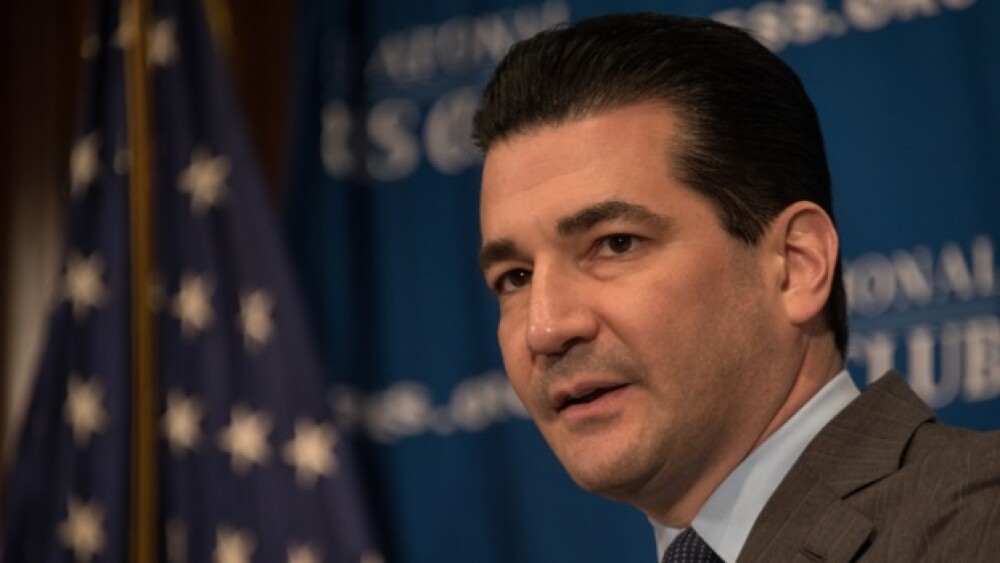Scott Gottlieb, commissioner of the Food and Drug Administration (FDA) is notoriously outspoken. Let’s take a look at some of Gottlieb’s more recent statements.
Albert H Teich / Shutterstock.com
Scott Gottlieb, commissioner of the Food and Drug Administration (FDA) is notoriously outspoken. Or, as BioPharmaDive recently noted, “Once again, Gottlieb waded into topics that his agency doesn’t directly work on.” They were specifically referring to his comments on reimbursement in government-sponsored health insurance. This isn’t generally the purview of the FDA but falls under the Centers for Medicare & Medicaid Services, and private insurance companies make their own decision on how they cover drugs and medical services.
Generally speaking, the FDA is concerned with the safety and approval of drugs. The agency’s relationship to drug pricing is typically related to encouraging competition and access, which in theory leads to lower drug prices. As a recent Forbes article noted, “FDA’s legislatively authorized mission is to ensure the safety and efficacy of medical treatments. Congress never indicated that the production cost or sales price of a product are relevant factors in a drug’s approval and ongoing regulation.”
Let’s take a look at some of Gottlieb’s more recent statements.
On the topic of drug pricing, BioPharmaDive wrote, “Gottlieb contrasted a ‘highly nimble, highly innovative’ model for developing drugs that target rare diseases to an ‘ossified’ reimbursement system. He lamented how radioactive pharmaceuticals had ‘some good drugs at the time that worked’ but are no longer used due to reimbursement issues, directly comparing that experience to what CAR-T may face.”
“We’re doing the same thing with CAR-T right now,” Gottlieb said. “I think we have a window of opportunity to think about how we are going to reimburse that appropriately. There are things that FDA can potentially do in terms of how we label the products, but we’re going to need to think about what are appropriate reimbursement … for these novel therapies.”
On October 22, Gottlieb commented on the agency’s efforts to improve the efficiency and transparency of its tobacco product application process. It will focus on two areas: reducing the nicotine levels in combustible cigarettes and, Gottlieb stated, “harnessing new forms of nicotine delivery that could allow currently addicted adult smokers to get access to nicotine without all the risks associated with lighting tobacco on fire.”
On October 23, Gottlieb weighed in on the agency’s efforts to improve the availability of naloxone to reduce opioid overdose deaths. Naloxone, marketed under several names, such as Kaleo’s Evzio and Adapt Pharma’s Narcan, as well as generic formulations, is designed to rapidly reverse opioid overdose. The agency will hold a two-day advisory committee meeting in December to discuss how to increase the availability of naloxone.
Gottlieb stated, “At this meeting, we’ll be asking our external advisors from the FDA’s Anesthetic and Analgesic Drug Products and the Drug Safety and Risk Management Advisory Committees to consider various options for increasing access to naloxone. They will help us weigh logistical, economic and harm reduction aspects of different strategies. And we will consider whether naloxone should be co-prescribed with all or some opioid prescriptions to reduce the risk of overdose death.”
On the same day, also related to opioids, Gottlieb discussed the agency’s involvement in Operation Pangea XI, an international partnership that targeted 465 websites that illegally sell potentially dangerous, unapproved opioids, cancer drugs and antiviral drugs in the U.S.
Gottlieb said, “The sale of potentially dangerous and counterfeit drugs by criminal networks on the internet is a large and growing threat to the public health. The illegal online pharmacies that we’re taking action against are often run by sophisticated criminal networks that knowingly and unlawfully distribute illicit drugs, including potentially counterfeit medicines and controlled substances both on the surface and dark web.”
And a day later, still about the opioid epidemic, Gottlieb talked about President Trump signing the Substance Use-Disorder Prevention that Promotes Opioid Recovery and Treatment (SUPPORT) for Patients and Communities Act. He noted that the agency, with the Secretary of the Department of Health and Human Services, has worked on a plan that “falls into four main buckets. First, our efforts to decrease exposure to opioids as a way to prevent new addiction; second, advancing innovation in pain medicines that don’t have the same risks as opioids; third, the development and use of better treatments to help those with opioid use disorder; and fourth, increasing our enforcement and interdiction work aimed at illicit drugs such as fentanyl, especially when it comes to products being shipped illegally through the international mail facilities (MFs).”





